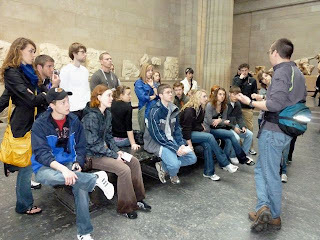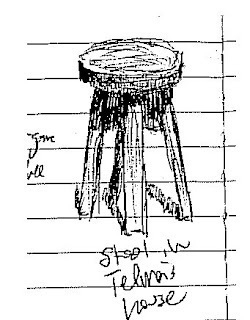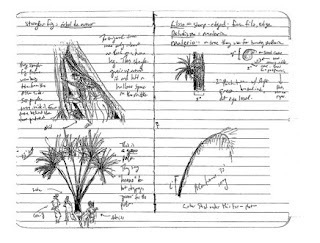Louis Agassiz
∞
On Traveling and Journaling
It's been too long since I've blogged. My excuse? I've been traveling a lot, including quite a bit with students. In the last few months I've been in Belize, Guatemala, Greece, and the UK with my students.
This probably sounds like a dream life, and I have to admit it's not all that bad.
But it's also a lot of work. A weeklong class in Greece usually takes me a little over a year to prepare, and in the semester leading up to it the workload approaches the amount of preparation I do for any of my other classes. Last fall I was teaching my usual load plus prepping two study-abroad courses, so I was swamped much of the time.
But it's worth it. My students come back with perspectives they could not have gained at home, if their journals are to be believed.
I always require my students to keep a journal while we're traveling. Sometimes I ask them specific questions, but usually I tell them to journal not for me but for themselves. You may think this naive, and you may be right. But I'd rather be naive than cynical. That is, I'd rather appeal to their self-interest and to their own sense of themselves as growing learners than force them to write answers to my pre-fab questions.
I do give them some guidance, however. Here are some of the things I teach them about journaling:
1) Pay attention to the little things, and write down whatever catches your attention. If you noticed it, it probably matters.
2) Pay attention to all of your senses. We tend to write about major events that happened, as though we were news reporters looking for the big story. But why not write about the smells? What sounds do you hear? What do the birds or the streets or the nighttimes sound like? How does the place you're in feel on your skin? What new tastes have you encountered? And so on.
3) Write continuously. Don't plan to write a sketch or outline and then fill it in later. As soon as you are on that plane home you will begin to forget what you experienced, and you will forget far more quickly than you want to believe. Write now.
4) Write "gestures" and impressions. Some of us have very good prose composition skills, and some of us do not. But all of us can write down a few phrases, a few adjectives, a few words we've heard in passing. Why not include entries in which you stand in one place and write down a list of nouns, of verbs, of adjectives that strike you as you soak the place in?
5) Draw pictures. This is one of the best pieces of advice I've ever received, and I am no artist. Cameras are great, but they capture what they see. Drawing captures what you see. Drawing also forces you to see what you wouldn't have seen otherwise. As Louis Agassiz once said, a pencil is one of the best tools for seeing. One of the best drawing tools I know of is a cheap ball-point pen. You don't need fancy paper, and you don't need a lot of time. Most of my best journal drawings are made in under two minutes with a cheap pen.
Try this out, and see if it doesn't completely change your journals. When I'm in Greece, I like to show my students the different kinds of stonework in ancient walls. The kind of stonework is helpful for dating the site, and it tells us a lot about the technology of the people who built the walls. I've found that as I try to draw a section of wall, the differences between cyclopean walls, Lesbian walls, and Roman walls become clearer to me, I remember them better, and I am better able to teach about them.
6) Revisit your journal periodically. Last of all, when you get back, revisit your journal from time to time. Start off doing so every week, and then every month and every year. When you revisit it, add a page or two of notes. What does your experience traveling back then mean to you now? Traveling is a luxury some of us enjoy, but it can also be a valuable learning opportunity, one that continues to be valuable for as long as we continue to reflect on it.
Do you have other journaling tips? I'd love to hear them. Meanwhile, I've got to get back to preparing for my next trips and courses abroad.
Buen viaje!
This probably sounds like a dream life, and I have to admit it's not all that bad.
But it's also a lot of work. A weeklong class in Greece usually takes me a little over a year to prepare, and in the semester leading up to it the workload approaches the amount of preparation I do for any of my other classes. Last fall I was teaching my usual load plus prepping two study-abroad courses, so I was swamped much of the time.
But it's worth it. My students come back with perspectives they could not have gained at home, if their journals are to be believed.
I always require my students to keep a journal while we're traveling. Sometimes I ask them specific questions, but usually I tell them to journal not for me but for themselves. You may think this naive, and you may be right. But I'd rather be naive than cynical. That is, I'd rather appeal to their self-interest and to their own sense of themselves as growing learners than force them to write answers to my pre-fab questions.
I do give them some guidance, however. Here are some of the things I teach them about journaling:
1) Pay attention to the little things, and write down whatever catches your attention. If you noticed it, it probably matters.
2) Pay attention to all of your senses. We tend to write about major events that happened, as though we were news reporters looking for the big story. But why not write about the smells? What sounds do you hear? What do the birds or the streets or the nighttimes sound like? How does the place you're in feel on your skin? What new tastes have you encountered? And so on.
3) Write continuously. Don't plan to write a sketch or outline and then fill it in later. As soon as you are on that plane home you will begin to forget what you experienced, and you will forget far more quickly than you want to believe. Write now.
4) Write "gestures" and impressions. Some of us have very good prose composition skills, and some of us do not. But all of us can write down a few phrases, a few adjectives, a few words we've heard in passing. Why not include entries in which you stand in one place and write down a list of nouns, of verbs, of adjectives that strike you as you soak the place in?
5) Draw pictures. This is one of the best pieces of advice I've ever received, and I am no artist. Cameras are great, but they capture what they see. Drawing captures what you see. Drawing also forces you to see what you wouldn't have seen otherwise. As Louis Agassiz once said, a pencil is one of the best tools for seeing. One of the best drawing tools I know of is a cheap ball-point pen. You don't need fancy paper, and you don't need a lot of time. Most of my best journal drawings are made in under two minutes with a cheap pen.
Try this out, and see if it doesn't completely change your journals. When I'm in Greece, I like to show my students the different kinds of stonework in ancient walls. The kind of stonework is helpful for dating the site, and it tells us a lot about the technology of the people who built the walls. I've found that as I try to draw a section of wall, the differences between cyclopean walls, Lesbian walls, and Roman walls become clearer to me, I remember them better, and I am better able to teach about them.
6) Revisit your journal periodically. Last of all, when you get back, revisit your journal from time to time. Start off doing so every week, and then every month and every year. When you revisit it, add a page or two of notes. What does your experience traveling back then mean to you now? Traveling is a luxury some of us enjoy, but it can also be a valuable learning opportunity, one that continues to be valuable for as long as we continue to reflect on it.
Do you have other journaling tips? I'd love to hear them. Meanwhile, I've got to get back to preparing for my next trips and courses abroad.
Buen viaje!



